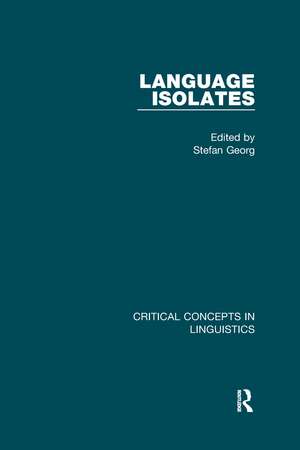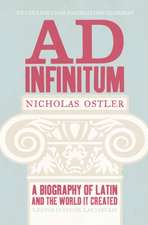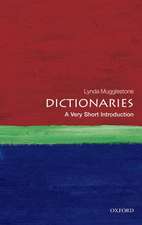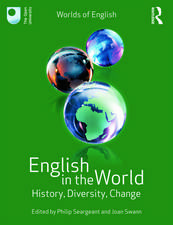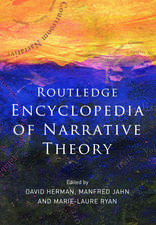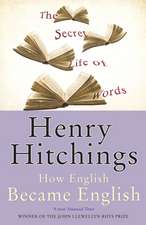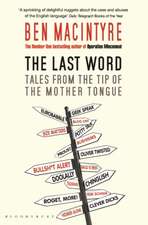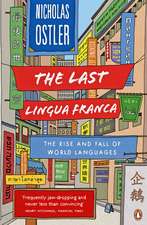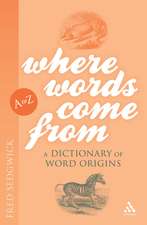Language Isolates: Critical Concepts in Linguistics
Editat de Stefan Georgen Limba Engleză Hardback – 20 apr 2015
Some of the gathered works are general introductions to their object language (in terms of sociolinguistics, attestation, documentation, history of scholarship, guides to published studies, overviews of linguistic characteristics), others highlight and discuss particularly salient and interesting typological characteristics of an isolate (some of them are breakthrough studies for the understanding of a particular language), and others focus on the very status of the language under discussion as an isolate in the first place. Some isolated languages are still very much alive; at least one of them, Korean, is a major national language. The majority of the languages and small families covered here are endangered, and some will certainly cease to be used during the coming decades. Thus, isolated languages are particularly interesting objects for students of language endangerment, but they are also prime research objects for linguistic descriptionists, for, when they are gone, not only will another of the 6,000 or so human languages have disappeared, but, in those cases, whole linguistic lineages (and their ways of coping with the world) will be gone forever.
Din seria Critical Concepts in Linguistics
- 34%
 Preț: 4369.55 lei
Preț: 4369.55 lei - 18%
 Preț: 1272.54 lei
Preț: 1272.54 lei - 34%
 Preț: 4805.70 lei
Preț: 4805.70 lei - 34%
 Preț: 6735.52 lei
Preț: 6735.52 lei - 34%
 Preț: 9833.67 lei
Preț: 9833.67 lei - 34%
 Preț: 7301.72 lei
Preț: 7301.72 lei - 14%
 Preț: 6742.03 lei
Preț: 6742.03 lei - 34%
 Preț: 9278.22 lei
Preț: 9278.22 lei - 34%
 Preț: 10679.71 lei
Preț: 10679.71 lei - 34%
 Preț: 7861.94 lei
Preț: 7861.94 lei - 34%
 Preț: 6742.44 lei
Preț: 6742.44 lei - 34%
 Preț: 7586.13 lei
Preț: 7586.13 lei - 34%
 Preț: 6700.27 lei
Preț: 6700.27 lei - 34%
 Preț: 6500.82 lei
Preț: 6500.82 lei - 34%
 Preț: 4373.63 lei
Preț: 4373.63 lei - 34%
 Preț: 6191.71 lei
Preț: 6191.71 lei - 34%
 Preț: 6136.37 lei
Preț: 6136.37 lei - 34%
 Preț: 6238.76 lei
Preț: 6238.76 lei - 34%
 Preț: 8986.73 lei
Preț: 8986.73 lei - 34%
 Preț: 6189.52 lei
Preț: 6189.52 lei - 34%
 Preț: 6209.19 lei
Preț: 6209.19 lei - 34%
 Preț: 4655.19 lei
Preț: 4655.19 lei - 34%
 Preț: 9272.88 lei
Preț: 9272.88 lei - 34%
 Preț: 6733.97 lei
Preț: 6733.97 lei - 34%
 Preț: 7584.39 lei
Preț: 7584.39 lei - 34%
 Preț: 6489.32 lei
Preț: 6489.32 lei - 34%
 Preț: 6741.19 lei
Preț: 6741.19 lei - 34%
 Preț: 5170.36 lei
Preț: 5170.36 lei - 34%
 Preț: 6739.17 lei
Preț: 6739.17 lei - 34%
 Preț: 5944.30 lei
Preț: 5944.30 lei - 34%
 Preț: 6735.10 lei
Preț: 6735.10 lei - 34%
 Preț: 7302.73 lei
Preț: 7302.73 lei - 34%
 Preț: 4237.71 lei
Preț: 4237.71 lei - 34%
 Preț: 4941.28 lei
Preț: 4941.28 lei - 34%
 Preț: 6136.37 lei
Preț: 6136.37 lei - 34%
 Preț: 5619.64 lei
Preț: 5619.64 lei - 34%
 Preț: 6136.37 lei
Preț: 6136.37 lei - 34%
 Preț: 8993.29 lei
Preț: 8993.29 lei - 34%
 Preț: 4932.73 lei
Preț: 4932.73 lei - 34%
 Preț: 6145.14 lei
Preț: 6145.14 lei - 34%
 Preț: 7054.47 lei
Preț: 7054.47 lei - 34%
 Preț: 5496.78 lei
Preț: 5496.78 lei - 18%
 Preț: 5920.08 lei
Preț: 5920.08 lei - 34%
 Preț: 4664.16 lei
Preț: 4664.16 lei - 34%
 Preț: 5936.34 lei
Preț: 5936.34 lei
Preț: 4378.10 lei
Preț vechi: 6610.51 lei
-34% Nou
Puncte Express: 6567
Preț estimativ în valută:
837.86€ • 864.38$ • 709.12£
837.86€ • 864.38$ • 709.12£
Carte tipărită la comandă
Livrare economică 04-18 martie
Preluare comenzi: 021 569.72.76
Specificații
ISBN-13: 9780415827348
ISBN-10: 0415827345
Pagini: 1792
Ilustrații: 30
Dimensiuni: 156 x 234 mm
Greutate: 3.29 kg
Ediția:1
Editura: Taylor & Francis
Colecția Routledge
Seria Critical Concepts in Linguistics
Locul publicării:Oxford, United Kingdom
ISBN-10: 0415827345
Pagini: 1792
Ilustrații: 30
Dimensiuni: 156 x 234 mm
Greutate: 3.29 kg
Ediția:1
Editura: Taylor & Francis
Colecția Routledge
Seria Critical Concepts in Linguistics
Locul publicării:Oxford, United Kingdom
Descriere
This collection brings together articles which deal with the 'language isolates' of the world. 'Isolated' languages are languages without any known relatives, languages which are not demonstrably part of any 'language family', with Etruscan, Basque and Ainu being arguably some of the best-known examples of such 'linguistic orphans'. The language-specific articles collected here are arranged geographically, and each language-chapter is preceded by a short introduction to the linguistic situation of the language(es) involved and, if not given in the papers and book-chapters themselves, to the current state of research and past and present scholarly debates. The volumes are preceded by a problem-oriented general introduction, which deals with the basic concepts and methodological principles of language classification, the present state and the nature of ongoing controversies, an epistemiological typology of language families, and, in the light of this, a theoretical justification of the concept of isolates as well as the choice of languages covered in the volumes.
